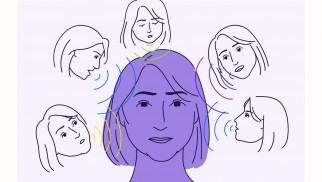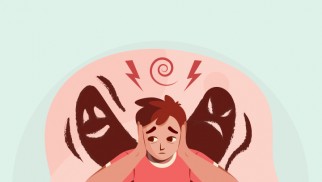Mar 14 / 2025
Understanding Schizophrenia: A Journey Through the Mind


What Is Schizophrenia and Why Does It Matter?
- Have you ever wondered what it’s like to lose touch with reality? Schizophrenia is a complex and chronic mental disorder that affects a person's perception of the world.
- It is characterized by hallucinations, delusions, disorganized thinking, and impaired daily functioning.
- This disorder impacts millions of people worldwide, leading to significant distress for both patients and their families.
- Without proper treatment, schizophrenia can lead to severe complications, including social isolation and difficulty maintaining relationships and employment.
- Understanding this condition is the first step toward reducing stigma and finding effective treatments.
Symptoms and Early Warning Signs
- Schizophrenia often develops gradually, making early detection crucial for better outcomes.
- Common symptoms include:
- Auditory and visual hallucinations (hearing voices or seeing things that aren’t there).
- Delusions (strong beliefs that aren’t based on reality).
- Disorganized speech and difficulty expressing thoughts clearly.
- Lack of motivation and reduced emotional expression.
- Trouble with memory and concentration.
- Early signs can appear in adolescence or early adulthood, and recognizing them can lead to early intervention and better management.
Causes and Risk Factors
- The exact cause of schizophrenia is unknown, but researchers believe it results from a combination of genetic, environmental, and brain chemistry factors.
- Potential risk factors include:
- Family history of schizophrenia or other mental illnesses.
- Brain structure abnormalities and imbalances in neurotransmitters like dopamine.
- Exposure to viruses or malnutrition before birth.
- Stressful or traumatic experiences, particularly in childhood.
- Substance abuse, particularly the use of hallucinogenic drugs like LSD or excessive cannabis consumption.
- Understanding these risk factors helps in early diagnosis and the development of better prevention strategies.
The Impact on Daily Life
- Schizophrenia doesn’t just affect the individual; it has a profound impact on families, workplaces, and communities.
- Challenges faced by those with schizophrenia include:
- Difficulty maintaining relationships due to erratic behavior or communication issues.
- Struggles with employment, as symptoms interfere with focus and task completion.
- Increased risk of homelessness and financial instability.
- Higher likelihood of substance abuse as individuals seek relief from distressing symptoms.
- Limited access to proper medical care and support systems.
- Despite these challenges, with the right treatment and support, many individuals with schizophrenia can lead fulfilling lives.
Treatment and Management Strategies
- While schizophrenia has no cure, it can be managed effectively with a combination of treatments.
- Common approaches include:
- Medication – Antipsychotic drugs help manage symptoms by balancing brain chemicals.
- Therapy – Cognitive-behavioral therapy (CBT) helps individuals recognize and change harmful thought patterns.
- Lifestyle adjustments – Regular exercise, healthy eating, and structured routines can improve overall well-being.
- Support systems – Family, friends, and support groups play a crucial role in recovery.
- Hospitalization – In severe cases, inpatient treatment may be necessary to stabilize symptoms.
- A multidisciplinary approach is key to ensuring long-term stability and improvement.
Seroquel (Quetiapine): A Solution for Schizophrenia
- One of the most widely prescribed medications for schizophrenia is Seroquel (Quetiapine).
- Seroquel works by affecting neurotransmitters in the brain, helping to regulate mood and perception.
- Benefits of Seroquel include:
- Reduction of hallucinations and delusions.
- Improvement in thought organization and emotional stability.
- Lower risk of severe side effects compared to some older antipsychotics.
- Effective management of mood disorders that often accompany schizophrenia.
- As with any medication, Seroquel should be taken under the guidance of a healthcare provider to monitor side effects and effectiveness.
Schizophrenia is a challenging disorder, but with early intervention, proper treatment, and support, individuals can regain control over their lives. Understanding the condition and its impact helps reduce stigma and promotes empathy for those affected. Modern treatments, including medications like Seroquel, have significantly improved the quality of life for many patients. With continued research and support, the future for individuals with schizophrenia looks brighter than ever.
Article Post: Editorial Team of RXShop.md
(Updated at Mar 14 / 2025)
Seroquel Quetiapine articles:
Seroquel Quetiapine 200 mg
Seroquel, an antipsychotic, treats conditions like schizophrenia and bipolar disorder.
(2)

